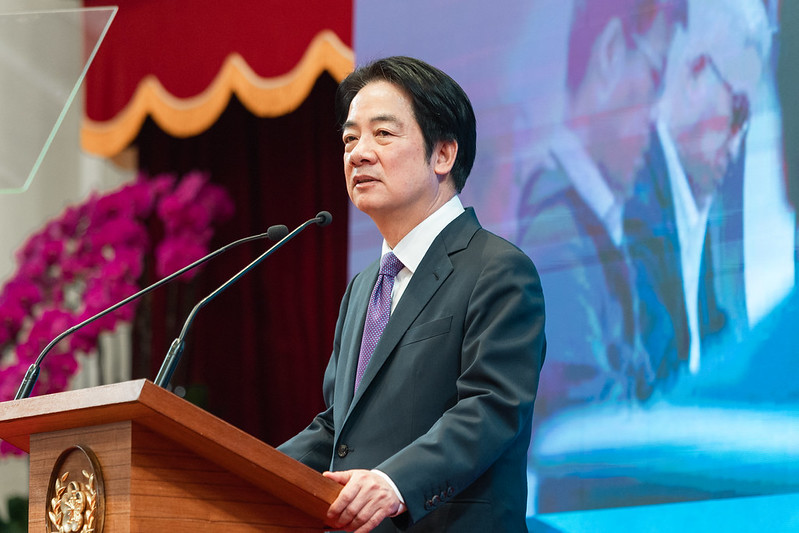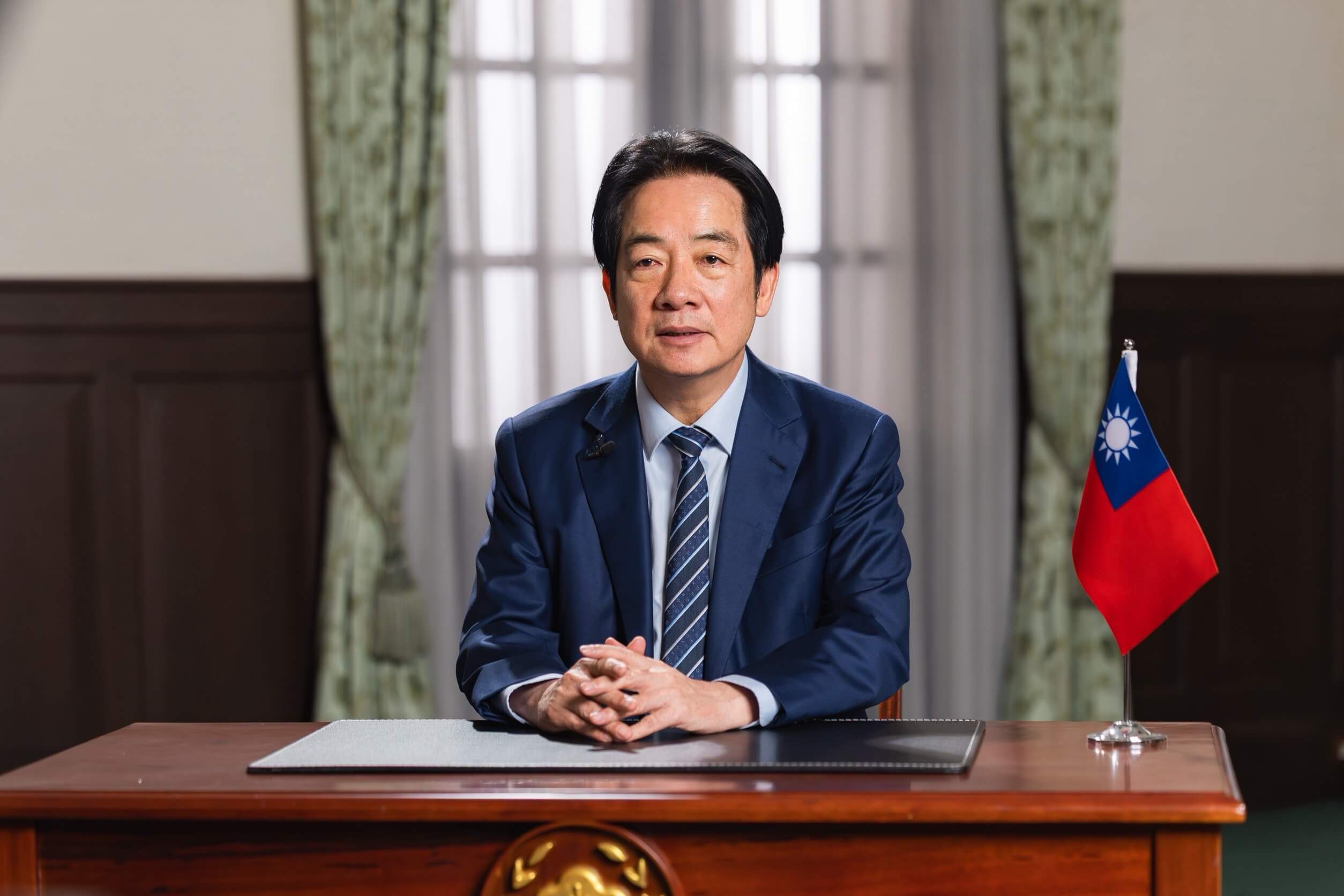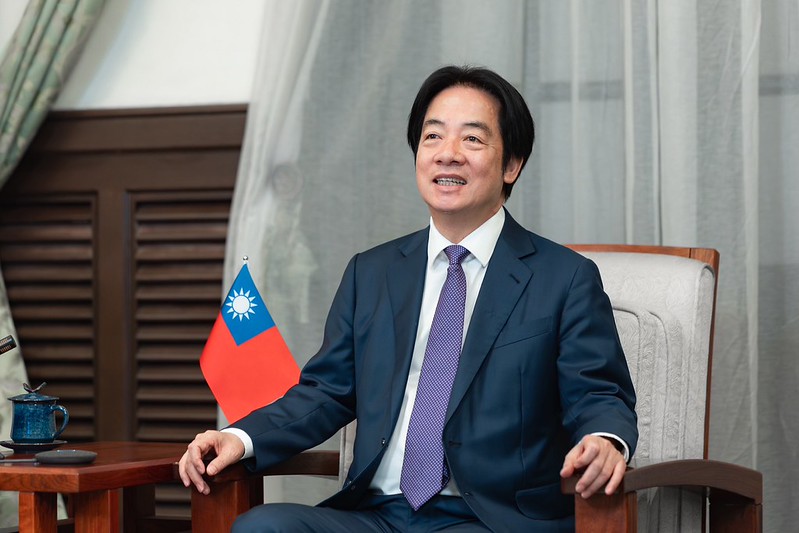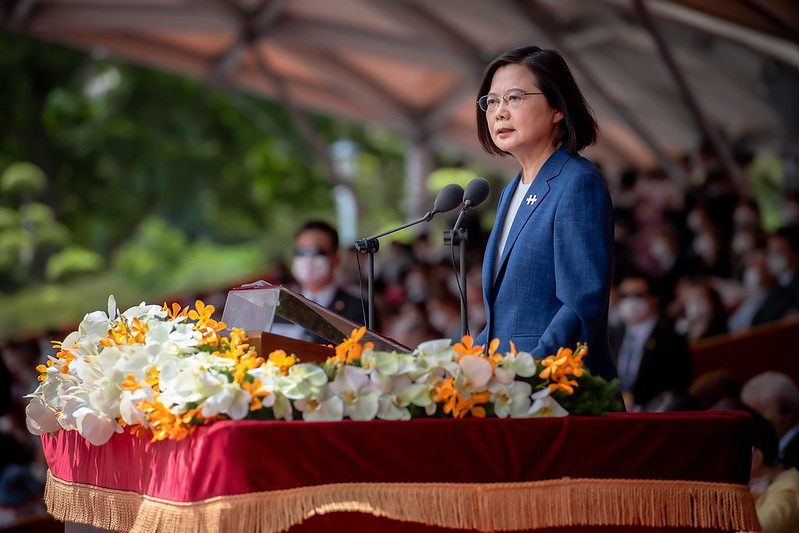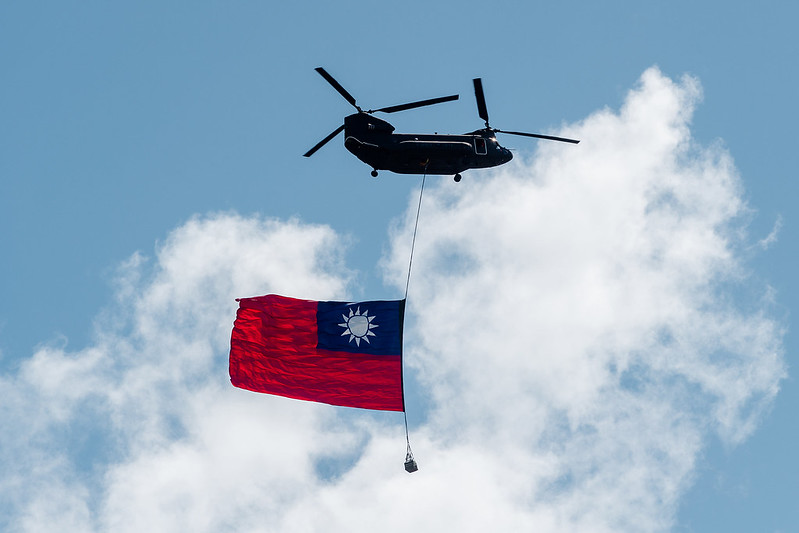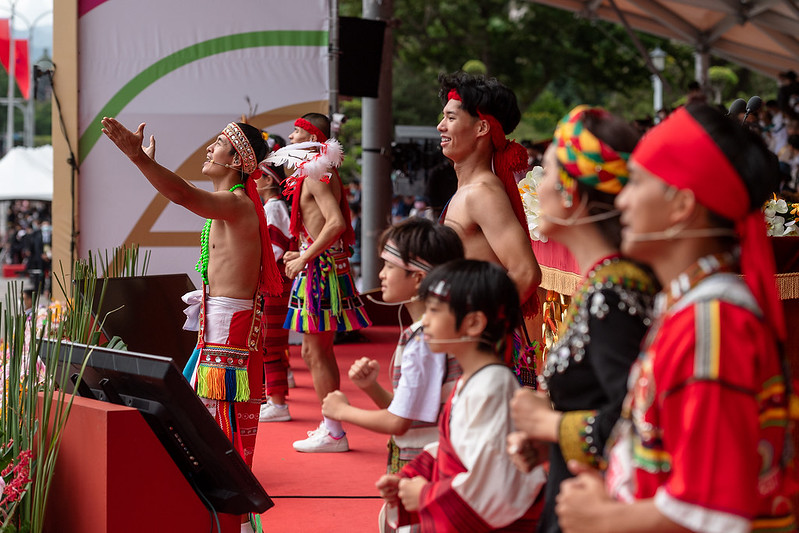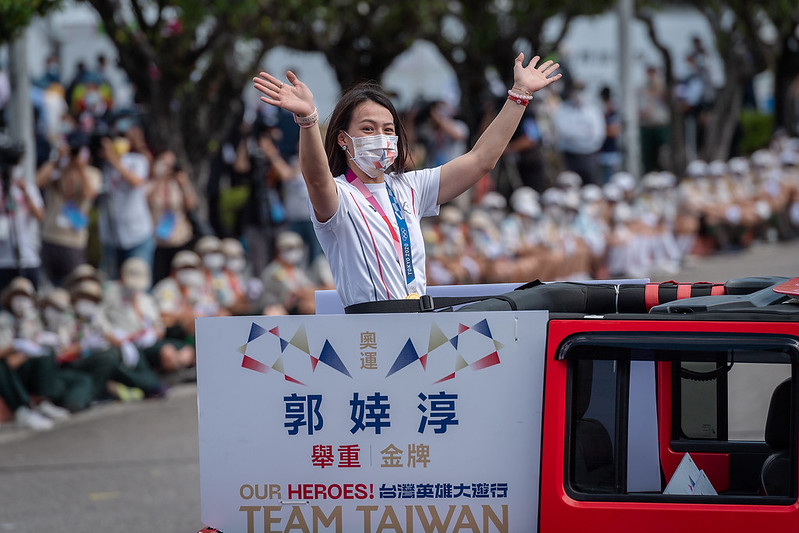News & activities
 News releases
News releases
President Tsai Ing-wen on the morning of October 10 attended the ROC's 110th Double Tenth National Day Celebration in the plaza fronting the Presidential Office Building, and delivered an address entitled "Forging a Stronger Consensus: Standing United to Protect Taiwan."
A translation of the president's address follows:
National Day Celebration Chairperson Yu Shyi-kun (游錫堃), distinguished guests, dear friends, and my fellow citizens watching via TV or the Internet: Good morning.
I. Resilience through unity and international pandemic cooperation
Today is the 110th National Day of the Republic of China. Every year, on this day, we gather together to celebrate our nation's birthday.
On this solemn occasion, we pay tribute to our forebears who called this land their home. Though they arrived in Taiwan at different times, they all dedicated themselves to our beautiful homeland. Today, everyone living in Taiwan is a part of this community in which we share a common destiny. Together, we have passed one test after another.
Beginning in May this year, Taiwan faced its greatest challenge since the outbreak of COVID-19. Over 800 people in this country have lost their lives to this disease. These people were our family, friends, and members of our shared community. I want to take this opportunity at the start of my speech to express my sincerest condolences to their families.
During this outbreak, we were also reminded of the great self-discipline and virtue possessed by the people of Taiwan.
No matter how hot the weather, everyone has remembered to wear face masks. Wherever you go, everyone uses their phones to scan QR codes for contact tracing, and maintains social distance. And when vaccines arrived, everyone followed our government's plans for an orderly vaccination drive. I truly appreciate how hard everyone has worked. The government does not take this cooperation for granted.
I want to extend a special thanks to Hon Hai Technology Group/Yonglin Foundation, Taiwan Semiconductor Manufacturing Company, and the Tzu Chi Foundation for working with the government. I also want to once again thank our doctors, nurses, and other medical personnel for their hard work. Most of all, I want to thank all the people of Taiwan. At this difficult time, it was our unity that protected our country, and our collective dedication to democracy that protected our beloved homeland.
Aside from helping ourselves, we have also received help from our friends across the international community. At a time when the international community continued to face a serious pandemic and vaccines were in short supply around the globe, Japan, the United States, Lithuania, Slovakia, the Czech Republic, and Poland all extended helping hands.
And, except for Lithuania, which will soon establish a representative office here, all of these countries are represented here today, an embodiment of this year's theme of "Broadening Democratic Alliances and Making International Friendships." I want to invite everyone here today to join me in showing our deepest appreciation to the representatives from these countries.
The Taiwanese people have a beautiful tradition of never forgetting how others have helped us. The face masks we sent out across the world last year showed that Taiwan can help. And the vaccines they sent us this year are vaccines of friendship. This is a virtuous cycle, and I can assure the international community that Taiwan will continue to contribute to the world and expand this virtuous cycle further afield.
Over the past year, the pandemic impacted domestic demand, but it did not affect our overall economic growth prospects.
The global shortage of semiconductor chips has highlighted Taiwan's importance in supply chains. And a changing situation in the Indo-Pacific has once again brought attention to Taiwan's key position in the region.
Taiwan-Japan ties continue to flourish, and our relationship with the European Union has grown closer. We resumed talks with the United States under our bilateral Trade and Investment Framework Agreement (TIFA). And we applied to join the Comprehensive and Progressive Agreement for Trans-Pacific Partnership (CPTPP). In Washington, Tokyo, Canberra, and Brussels, Taiwan is no longer on the margins, with more and more democratic friends willing to stand up for us.
We believe we have the ability to work with like-minded partners to contribute to the international community. Taiwan today is no longer seen as the orphan of Asia, but as an Island of Resilience that can face challenges with courage.
II. Unprecedented challenges amid a complex regional landscape
But the more we achieve, the greater the pressure we face from China. So I want to remind all my fellow citizens that we do not have the privilege of letting down our guard.
At this moment, the global political landscape is undergoing drastic change. Free and democratic countries around the world have been alerted to the expansion of authoritarianism, with Taiwan standing on democracy's first line of defense.
As a result, amid this evolving global landscape, the Republic of China today finds itself in a situation that is more complex and fluid than at any other point in the past 72 years. Every step we take will influence our world's future direction, and our world's future direction will likewise affect the future of Taiwan itself.
The situation in the Indo-Pacific region is becoming more tense and complex by the day. After taking complete control of Hong Kong and suppressing democracy activists, the Beijing authorities also shifted away from the path of political and economic development that they had followed since "reform and opening up" began decades ago.
At the same time, regional order is being challenged in the South and East China Seas. The routinization of Chinese military activity in Taiwan's southwestern air defense identification zone (ADIZ) has seriously affected both our national security and aviation safety.
In contrast, democratic countries are working to strengthen our broad-based, mutual cooperation in order to respond to regional and global developments. The G7, NATO, EU, and QUAD have all highlighted the importance of peace and security in the Taiwan Strait, while expressing concern over whether China may unilaterally undermine the status quo of peace and stability in the Indo-Pacific region.
I want to reiterate that Taiwan is willing to do its part to contribute to the peaceful development of the region. Our position on cross-strait relations remains the same: neither our goodwill nor our commitments will change. We call for maintaining the status quo, and we will do our utmost to prevent the status quo from being unilaterally altered.
I also want to emphasize that resolving cross-strait differences requires the two sides of the strait to engage in dialogue on the basis of parity.
We hope for an easing of cross-strait relations and will not act rashly, but there should be absolutely no illusions that the Taiwanese people will bow to pressure. We will continue to bolster our national defense and demonstrate our determination to defend ourselves in order to ensure that nobody can force Taiwan to take the path China has laid out for us. This is because the path that China has laid out offers neither a free and democratic way of life for Taiwan, nor sovereignty for our 23 million people.
III. Building consensus around four commitments
The Republic of China came to Taiwan in 1949, 72 years ago. Over these past 72 years, we have gone from poverty to prosperity, from authoritarianism to democracy, and from uniformity to diversity. Slowly but surely, we remade the Republic of China (Taiwan) into what it is today.
Admired around the world, what we have today is the result of the work of many generations. No one group can take sole credit for this work, nor should any one group be denied credit for what we have all achieved together.
During the August 23 Artillery War of 1958 in Kinmen, our brave troops fought side by side, without regard for where one another came from. Party affiliation does not divide those working in Taiwan's crucially important semiconductor industry. Cheng Nan-jung's (鄭南榕) father was from China. Larisa Bakurova (瑞莎) hails from Ukraine. Wen Chen-ling's (温貞菱) mother is a Filipina of Chinese descent, and her father is part Hakka and part Japanese. Recently departed baseball star Wang Kuang-hui (王光輝) was a member of the indigenous Amis tribe.
We all get upset when our national flag is not displayed. We all get angry when Taiwan is suppressed. These are ups and downs that we all share. In this inclusive country, nobody is judged based on when they arrived, nobody is held accountable for the deeds of their ancestors, and nobody is excluded from our shared community because of where they came from. As long as we respect and appreciate this land and what it stands for, Taiwan will always welcome everyone with open arms and bring people together.
The past 72 years of development have transformed the face of our nation. But throughout this transformation, our resolve to uphold our sovereignty and defend our homeland has remained unchanged.
This conviction has been key to ensuring Taiwan's stability and preserving the fruits of our democracy. Over the past 72 years, our military's dedication to protecting our nation, as well as our understanding of why we fight, have been rooted in that conviction, which has been passed down by generation after generation of Taiwanese.
This resolve has never been limited to a single political party or faction. Kuomintang Chairman Eric Chu (朱立倫), Taiwan People's Party Chairman Ko Wen-je (柯文哲), and New Power Party Chairperson Chen Jiau-hua (陳椒華) are all in attendance today.
Your being here at this event is one of the beautiful scenes in Taiwan's democracy. There will always be competition between political parties. But whenever our nation's dignity or the future of our people is at stake, we come together for the sake of the Taiwanese people to defend our sovereignty and our free and democratic way of life.
Let us here renew with one another our enduring commitment to a free and democratic constitutional system, our commitment that the Republic of China and the People's Republic of China should not be subordinate to each other, our commitment to resist annexation or encroachment upon our sovereignty, and our commitment that the future of the Republic of China (Taiwan) must be decided in accordance with the will of the Taiwanese people.
These four commitments are the bottom line and common denominator that the people of Taiwan have given us. On the basis of this shared foundation, we have a responsibility to seek an even broader consensus, so that we can be united in the face of future challenges.
We all share the responsibility to ensure that the young people and future generations of this land can continue to live free.
IV. Cooperation across society to resolve our differences
Since taking office in 2016, I have worked to diversify trade, promote industrial innovation, transform our energy sector, and develop and bring in new talent so that everyone can see how Taiwan's economy is changing for the better.
Over the past few years, in response to changing global economic circumstances, we have facilitated the return of many overseas Taiwanese businesses and accelerated our industrial transformation, reversing the slow economic growth, capital outflow, and talent drain caused by the past 30 years of over-reliance on a single market.
Today, Taiwan's economic performance is back in the lead of the Four Asian Tigers, attracting global attention and proving that we can create a more resilient and self-reliant economic development model.
We have adopted a new economic approach in which we are no longer dependent on a single market. This is the key to consolidating Taiwan's global economic standing and playing a more important role. My fellow citizens, a world of opportunity awaits us. We must persevere on this road so that Taiwan's economy can continue to grow and thrive over the next 30 years.
In addition to transforming our economy, we have overcome many obstacles to implement a number of reforms. We have expanded our social care system, made diplomatic breakthroughs, and are now in the process of carrying out national defense reform. The results of our years of hard work are gradually becoming clear to our citizens and the world at large.
Many have asked me what we want to do for Taiwan in the years ahead. My answer is simple. In addition to boldly carrying out reforms and building a stronger nation, we want to establish a solid and lasting foundation for our nation's future development by giving the Republic of China (Taiwan) the capabilities, and the social stability, to face the uncertainty and challenges of a new era.
We must also address the longstanding and divisive issues on which we have struggled to reach consensus. On these issues, we must work to forge consensus, and find solutions that are broadly acceptable throughout society. Only by resolving these longstanding disputes can Taiwan move forward without looking backward.
We must respond to national development needs by making necessary adjustments to bureaucracy, local institutions, national land use, regional development, and other important governance issues, so that we can optimize government efficiency and most faithfully reflect the will of the people.
Of these issues, constitutional reform is one we must face head-on. Our Legislative Yuan has established a Constitutional Amendment Committee, with the current round of amendments based on the Constitution of the Republic of China and designed to preserve our free and democratic constitutional system.
Knowing that there is a very high threshold for passing a constitutional amendment, I want to make an appeal across party lines, given that the issue of constitutional reform is a matter of national governance. I call on everyone, regardless of party affiliation, to set aside your predispositions and engage in a serious review of constitutional issues, so that we can find common ground.
The work of transitional justice is also testing our generation's wisdom and courage, as we seek to heal the wounds of the past and discern historical truth.
In addition, we must consider the direction of our national energy policy.
No nation can maintain economic momentum with an inconsistent energy policy. We have already aligned ourselves with the international community in announcing our goal to work toward net zero emissions by 2050. We also need to work with all sectors of society to draw up a roadmap that will help us stay on top of relevant developments and assess risks early on, so that we can build a more flexible and responsive power supply network. This is key to both our competitiveness and environmental sustainability.
Dealing with these important issues is the only way to lay a foundation for long-term stability and leave a better country for future generations. In the past, differences in party stance or political identification often turned discussions of the methods and approaches needed to solve these issues into endless ideological battles. These disputes are of no help to our nation's development, and only compel us to waste our own energy without making any progress.
This is why, during my next few years in office, I want to draw on the dynamism of our society to look for ways to solve these issues together. By facilitating cooperation between society and government, we can work to find common ground among different ideas, gradually resolve difficult issues, and build a firm foundation on which to guide our national development.
V. Engaging the world with pride and confidence
2021 has been a year of many challenges, as well as many heartwarming moments. This summer's Tokyo Olympics saw Taiwan's athletes turn in record performances. Today, on our National Day, I want to express my gratitude to all our athletes and their support staff. Thank you for helping Taiwan shine on the international stage.
During the Tokyo Olympics, the Taiwanese people once again realized a sense of shared belonging. I know some people have admitted that, out of fear of jinxing our athletes, they avoided watching our athletes in action, and instead did all their cheering in silence. I also heard that some people were so nervous watching the archery competition that their hearts were beating even faster than the competitors'.
This is what it means to be part of a community. A community is an invisible bond that ties us all together, letting us share our happiness and our sorrow, our glory and our pain.
During the men's doubles badminton gold medal match, I am sure that when the word "in" appeared on the screen, there were more than a few Taiwanese who erupted with joy, and even shed some tears.
We had waited so long for that moment, for Taiwan's achievements, Taiwan's confidence, and Taiwan's courage to be seen and appreciated by the world. This summer, that moment arrived.
Over the past few days, many people in Taipei stopped to look up at the planes rehearsing for our National Day Celebration. What they were looking at is our Air Force, which keeps us and our country safe.
In addition to our Air Force, many other military units were practicing for our National Day Celebration on the streets of Taipei. Dredging engineers, members of our Chemical Corps, the motorcycles of our Military Police Command's Quick Reaction Company, and many other combat vehicles that we rarely get to see all passed here before us on Chongqing South Road, fully equipped and ready to deploy.
Many were busy taking photos, perhaps unsure which units these are, or what the equipment is called, but with a certain sense of security. These are our troops—our troops who safeguard our homeland. When disaster strikes, they come to the rescue. When our sovereignty, territory, freedom, or democracy is threatened, they defend our country with their lives.
One of the most heartwarming images of 2021 was of the Mirage 2000 fighter jets sent by our military into the skies above Taiwan to welcome our Olympic heroes back home.
Our athletes and troops are all national heroes. I sincerely hope that my fellow citizens believe in the greatness of Taiwan, believe in the importance of Taiwan, and believe that our community of 23 million people can stand proud on the international stage.
Let us move forward with confidence and pride, as masters of our own destiny. Let us embrace our global role, and make Taiwan a Taiwan of the world. I wish the Republic of China a happy 110th anniversary, and good health and many happy returns to all my fellow citizens. Thank you.

